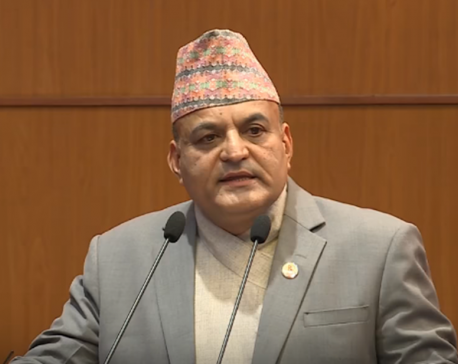
OR
#Leadership Thoughts
Set the Tone for Post-leadership Reality
Published On: December 19, 2022 09:00 AM NPT By: Fr. Augustine Thomas, S.J.


Fr. Augustine Thomas, S.J.
Father Augustine Thomas has a PhD in ‘Leadership Studies in Organization Development’ and currently serves as the Principal of St. Xavier’s College, Maitighar, Kathmandu.news@myrepublica.com
Managing oneself effectively as a leader sets the tone for a post-leadership life.
Leaders in a position can drop into emptiness and loneliness once they are no more there. Managing oneself while in a leadership role is, thus, important for managing oneself in retirement age.
Having worked in admirable leadership positions with numerous influential friends a call away, it shouldn’t be shocking if the once busy mobile phones of yours suddenly stop ringing, and the courtesy visit of influential friends become nothing but a forgotten past.
Loneliness coupled with the late middle age crisis batters a person with damaging self-esteem questions: “Have I become useless?” or “Who are my friends?” The awkwardness of not being in an influential position in the eyes of society makes it all the more painful at social gatherings. Therefore, managing oneself effectively as a leader sets the tone for a post-leadership life.
Giving a hundred per cent to the leadership role using effective skills can result in a successful career. The sweat and toil of the leader provide the drive to fulfill the mission and vision of the organization. If the leader is effective, he/she will see not only the organization reaching maturity in its life cycle but also the individuals under its care transforming into competent employees.
Whether your efforts bring success or failure, the leader takes the credit. The leader as a person is different from the role of the leader and is separated by a thin invisible layer. Ronald Heifetz in his book ‘Leadership without Easy Answers’ mentions, "Confusing role with self is a trap. Even though you may put all of yourself into your role – your passion, values, and artistry – the people in your setting will be reacting to you, not primarily as a person, but as the role you take in their lives. Even when their responses to you seem very personal, you need to read them primarily as reactions to how well you are meeting their expectations."
Finding one’s sole identity in the role of leadership alone is like pumping opium into a person. This psychological unification of the ‘role’ and the ‘self’ detaches the person from the self and dumps them in the temporary glorious phase of an office. This might even make the leader forget that a curse or praise is not aimed at them, but at the actions they make from their position. In the culture of Nepal or Asia, in general, where relationship and community take precedence over individualistic life, one can easily slip into the danger of sacrificing the ‘self’ to the role of leader and live in an illusion.
Here are a few tips to help manage oneself effectively from the tender age of their tenure as a leader.
A right mentor for all ages
Making your workplace an escape from unresolved personal issues will soon leave you in the mess that you kept evading. Therefore, one must face it alone or with the help of a mentor. There are various committees, units, and colleagues who can help one be more efficient in a leadership role, but what remains with the person forever is one’s own ‘self’, be it the sad, wounded, rejected, confused, happy, or content one. A noisy and gossiping company or a glass of drink won’t be a solution to it. One must return to that self at the end of the day.
Thus, a leader should have a mentor for personal growth. There has to be someone to help settle the dust and calm you, someone who carries the ability to understand your struggle and whom you can confide in. A mentor helps you to unmask yourself and shine in your originality, freeing you from the false excuses that have played as a defense mechanism.
Confusing relationships
Having colleagues and social friends is different from having a family and strongly-bonded friends outside your work role. The sense of relationship can be marred if we don’t develop genuine and lasting friendships carefully. Utilitarian acquaintances are not friendships. Losing a connection for not granting a favor, no matter how big or small, is just a business lost. Nothing to cry over. Such people come and go.
A well-connected family or strongly-bonded friendship will stick with you no matter how many disappointments there are or how many times you fail in being the ideal parents of children or a true friend. The key is “genuine relationship” will stay regardless of your social standing.
Sacred heart
The guru of the leadership niche, Heifetz, talks about the concept of the ‘Sacred Heart’ in his book ‘Leadership on the Line’. “The virtue of the sacred heart lies in the courage to maintain your innocence and wonder, your doubt and curiosity, and your compassion and love even through your darkest, most difficult moments. Leading with an open heart means you could be at your lowest point, abandoned by your people entirely powerless, yet remain receptive to the full range of human emotions without going numb, striking back or engaging in some other defense.”
This state of being comes from the ability to disconnect from the noises of the day and remaining in the “pure you” with the help of meditation, yoga, or with the powerful healing aura of nature. One must have a similar invisible safe home to come back to every day.
You May Like This

A Peep into the Neuro System of the Leader
A holistically formed leader is able to understand the people with immense compassion and yet not get driven by emotions.... Read More...

NC leader Surendra Raj Pandey nominated as National Assembly PP leader
KATHMANDU, Jun 6: Main opposition Nepali Congress has nominated Surendra Raj Pandey as the parliamentary party (PP) leader of the... Read More...

Party Chair and PP leader not same: Leader Thapa
CHITWAN, March 3: Nepali Congress leader Gagan Thapa has said that it would not be right for the same person... Read More...



Just In
- Sudurpaschim: Unified Socialist leader Sodari stakes claim to CM post
- ED attaches Raj Kundra’s properties worth Rs 97.79 crore in Bitcoin investment fraud case
- Newly-appointed Auditor General Raya takes oath
- CM Mahara expands Cabinet in Lumbini Province
- FinMin Pun addresses V-20 meeting: ‘Nepal plays a minimal role in climate change, so it should get compensation’
- Nepalis living illegally in Kuwait can return home by June 17 without facing penalties
- 'Trishuli Villa' operationalized with Rs 100 million investment
- Unified Socialist rejoins Lumbini Province govt following ministry allocation
















Leave A Comment